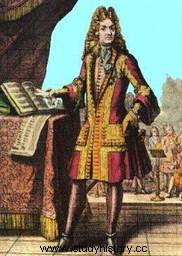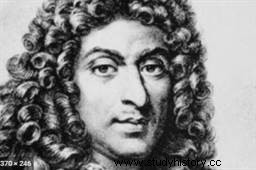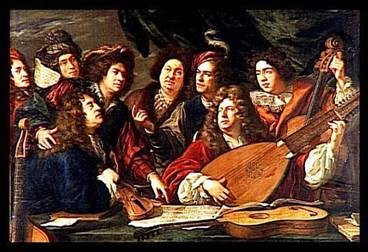 French composer of Italian origin, Jean-Baptiste Lully (1632-1687) obtained the exclusive management and operation of the Royal Academy of Music under Louis XIV. He then exercised a real monopoly on musical life, contributing to the development and codification of opera in France. Lully was one of the first to use the string quintet, the basis of the modern orchestra, reserving a large place for ballet. Like the Florentines, he makes extensive use of “recitative” and his works are imbued with a certain grandeur, like the solemn atmosphere of the century of the Sun King. His life inspired the filmmaker Gérard Corbiau to create a famous film:''Le Roi danse''.
French composer of Italian origin, Jean-Baptiste Lully (1632-1687) obtained the exclusive management and operation of the Royal Academy of Music under Louis XIV. He then exercised a real monopoly on musical life, contributing to the development and codification of opera in France. Lully was one of the first to use the string quintet, the basis of the modern orchestra, reserving a large place for ballet. Like the Florentines, he makes extensive use of “recitative” and his works are imbued with a certain grandeur, like the solemn atmosphere of the century of the Sun King. His life inspired the filmmaker Gérard Corbiau to create a famous film:''Le Roi danse''.
Jean-Baptiste Lully's youth and career
Jean-Baptiste Lully was born in Florence in a modest family of millers on November 29, 1632 under the name of Giovanni Battista Lulli, but little is known about his early youth . Very quickly, he was noticed by the knight Roger de Lorraine. Arrived in France in 1646, he was introduced as a chambermaid to the Duchess of Montpensier who wanted to perfect his knowledge of the Italian language.
 Gifted with undeniable musical gifts, he studied violin, guitar, harpsichord, composition, and proves to be an excellent dancer (balladin according to the expression of the time). As early as 1652 he belonged to the great '' band of violins du Roy '' which brought together twenty-four instrumentalists under Louis XIV. In 1653, he danced with the king in “le ballet de la nuit”. Very quickly he obtains the direction of a new group:the "band of small violins" sixteen in number (what the king familiarly called "the little band").
Gifted with undeniable musical gifts, he studied violin, guitar, harpsichord, composition, and proves to be an excellent dancer (balladin according to the expression of the time). As early as 1652 he belonged to the great '' band of violins du Roy '' which brought together twenty-four instrumentalists under Louis XIV. In 1653, he danced with the king in “le ballet de la nuit”. Very quickly he obtains the direction of a new group:the "band of small violins" sixteen in number (what the king familiarly called "the little band").
Naturalized French in 1661, Lully was appointed superintendent of music in the Roy's chamber and married Madeleine Lambert, daughter of the musician Michel Lambert (the latter went into exile in England to bringing in the French dramatic musical art). The couple will have six children, three of whom will in turn be musicians. Despite this prolific descent, Lully was known and criticized for his libertine tastes, in particular for his homosexuality which discredited him following a scandal in 1685 with Louis XIV, who hated what were then called ''les Italian manners''.
Lully employees
From 1664 to 1671, Lully will associate with the playwright Molière, creating with him the genre of ''comedy-ballet'' while continuing his court ballets. The creations with Molière bring together a combination of comedies, ballets and songs:"L'amour doctor" in 1665, the "comic pastoral" in 1667, "Georges Dandin" in 1668, "Monsieur de Pourceaugnac" in 1669, "le bourgeois gentleman and his Turkishness”. But in 1671 a dispute arose which resulted in the two artists becoming enemies.
Lully bought from Perrin in 1672 the ''privilege of the Royal Academy of Music''. Great favorite of Louis XIV who offered him the room of the Royal Palace, he then exercised an almost dictatorial power. He then collaborated with the librettist Philippe Quinault, then Thomas Corneille, Campistron and Fontenelle. /P>
The musician and his character
An intelligent musician, adored by the court, with an intriguing and fiery character, Lully was not always very scrupulous. However, he showed an overflowing activity, firmness, great will and remarkable qualities of orders in the administration of the opera. He was innovative in the field of rhythm and discipline in his orchestra, making the singers and dancers work himself, meticulously regulating the smallest detail. Its influence continued in France where it was played until the revolution of 1789, inspiring other musicians (François Couperin, Marin Marais, Jean-Philippe Rameau, Michel Delalande).
 During a rehearsal of a "Te Deum" written by him in honor of the healing of the king, Lully, carried away by his explosive temper, seriously injured his foot with the heavy conducting stick which he used to beat time and, the wound becoming infected, died shortly afterwards of gangrene, on March 22, 1687.
During a rehearsal of a "Te Deum" written by him in honor of the healing of the king, Lully, carried away by his explosive temper, seriously injured his foot with the heavy conducting stick which he used to beat time and, the wound becoming infected, died shortly afterwards of gangrene, on March 22, 1687.
Lully's merit is to have been able to adapt a musical style to the demands of his time. He gives a great place to the recitative close to spoken language, having studied at the Comédie Française the declamation of the actors, in particular the great interpreter of Racine (la Champmeslée). He gives a large place to the orchestra, brilliantly using flutes, cymbals and trumpets. He likes to divide his orchestra into groups that dialogue with each other or with the voices. Many pages of Lully still imbue us with their majestic grace.
More intellectual than sensitive, Lully brings to the opera all the qualities of classicism (majesty grandeur balance), but also all its drawbacks (slow action, certain monotonies) However, he knew how to achieve a perfect ensemble of cohesion and balance, so we can say that Lully's opera was the work of the "great century" dominated by the king, which we can undoubtedly compare to the beautiful architectural arrangement of Versailles or the colonnade of the Louvre.
Main works of Jean-Baptiste Lully
Court ballets
- The ballet of the seasons (1661), the ballet of the arts (1662) the ballet of the muses (1666) or the ballet of Flora (1669) the ballet of the nations etc. ..
Comedies-ballets
- In collaboration with Molière:"les fâcheux", "forced marriage", "doctor's love", "magnificent lovers" and the famous "bourgeois gentleman". ..
Lyrical tragedies
- The best known are:Gadmus and hermione (1673) Alceste (1674), Thésée (1675) Atys (1677), Phatéon 1683) Amadis (((1684), Armide (1686)
Miscellaneous works
- Instrumental music (trio dances) religious music (motets for the Roy's chapel)
Bibliography
- Jean-Baptiste Lully by Vincent Borel. South Acts, 2008.
- Jean-Baptiste Lully from Jérôme de La Gorce. fayard, 2002.
To go further
- The Sun King Orchestra - Symphonies, overtures &airs to play by Jean-Baptiste Lully. Music CD.
- Lully - Les Divertissements de Versailles / Les Arts Florissants, Christie. Music CD.
- The King dances, by Gérard Corbiau. DVD.
